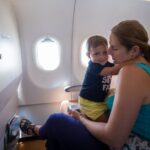Last Updated on July 18, 2025 by Muhammad Sohaib
Welcoming a newborn into the world is one of the most exciting moments for parents, grandparents, family, and friends. I still remember when I met my niece for the first time—everyone wanted to meet the new baby right away.
But during those early months, it’s critical to be mindful of certain rules. Health experts like Dr. Marcia VanVleet, MD, MPH, Associate Professor of Pediatrics at UMass Medical School, and Lead Newborn Hospitalist at The Birthplace in Baystate Franklin Medical Center, acknowledges how important it is to keep the baby safe from infection and illness.
Because a baby’s immune systems aren’t fully developed, limiting visits to only close, essential visitors helps reduce the risk of infections.
It’s just as important to ask before visiting and to follow the boundaries the family sets. New parents and caregivers are still learning to adjust to their new life, and too many extended visits can be overwhelming.
A short visit that’s done safely and respectfully, especially by those who are healthy and willing to follow the dos and do-nots, makes the whole experience better. This article discusses the best ways to show love without causing worry.
The key is to think about what’s best for the baby and support the new family during this beautiful but delicate time.
Hospital rules for visiting newborns
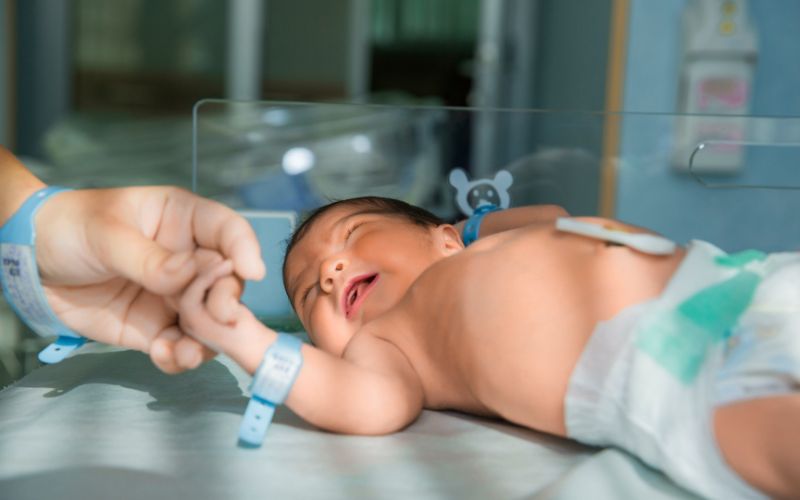
During my time volunteering at a hospital, I saw how important it is to be careful when visiting newborns. These tiny babies are susceptible to infections, which is why hospitals create clear rules to limit the spread of illnesses like colds and flu.
If you want to meet a newborn, it’s essential to follow the instructions set by the healthcare facility. Only come during certain hours, and remember there may be a limiting number of visitors allowed at once.
The Centers for Disease Control and Prevention (CDC) even recommends that anyone get vaccines for flu and whooping cough at least 2 weeks beforehand to give your body time to start producing antibodies.
When you enter the room, make sure your hands are washed thoroughly with soap before touching the baby. Do not touch any medical equipment, and avoid sitting on the bed.
Keep your voice low—loud noise can disturb other babies or families who might be sleeping. Parents may want some quiet time alone with their new baby, especially after a difficult birth or if there were complications.
So, always respect their wishes and be flexible if they delay your visit. Keeping your vaccinations up to date is one way to show you care about the baby’s safety and the family’s peace of mind.
Home visiting rules for newborns
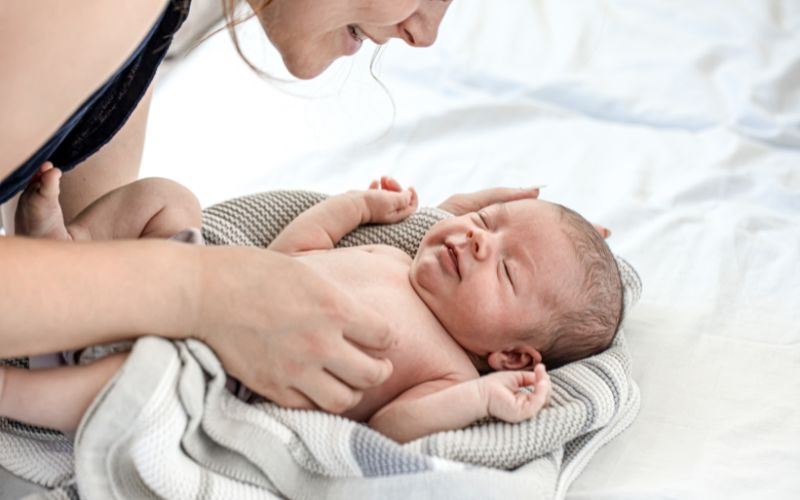
Bringing a baby home is a beautiful moment, and your friends, family, and other members are often eager to meet the newest addition. But it’s okay — and actually essential — to limit initial visitors.
In my case, we allowed only immediate family at first, after talking to health professionals. This was to reduce exposure to germs during the baby’s first month of life, which the World Health Organization (WHO) describes as a vulnerable period for a child’s survival.
We chose to delay extended visits and started planning visits for later weeks, especially after vaccinations at 2 months.
Until additional vaccines were done, we followed rules to help parents and caregivers settle into a routine, while also keeping our baby’s sleep schedule in mind.
We asked visitors to be up-to-date on their vaccinations, postpone visits if unwell, and to avoid coming if they’d tested positive for COVID-19 or had been around sick people recently.
Simple steps like washing hands, wearing a face mask, and holding the baby only at certain times and on certain days really made a difference.
If you want to establish safe boundaries, this kind of plan can make everyone feel included — while protecting your little one.
Why wait to have visitors?
In the first 6 months of life, newborns are extremely vulnerable to infections. Their immune systems are still developing and cannot yet make strong antibodies to protect them.
Babies get some immunities from the mother’s immunities passed on at birth, but these decrease soon after. This means that exposure to even mild illnesses like flu, RSV (respiratory syncytial virus), or COVID-19 can seriously affect a baby in ways it might not affect adults.
During winter season especially, when these viruses are more prevalent, it’s a good idea to create an imaginary health cocoon or safety cocoon for your baby.
As a parent, I remember how difficult it was to hold off visitors. But sources like Dr. VanVleet and many universal rules recommend delaying visitors or staggering them.
This approach gives you time to bond with your baby, get used to breastfeeding, and ease into a new nursing routine—especially for those recovering from C-sections or difficult births.
Some hospitals already enforce limited or no visitor policies to promote rest, bonding time, and getting to know your newborn without distractions.
At the beginning, it helps to establish a feeding schedule to keep things calm at home and to prioritize care over social obligations. Every family is different, so take your time choosing when and how to introduce your baby to others.
You may want to limit visits to immediate members of the family or trusted friends, especially those who understand your precautions.
Remember, your baby’s age and stage of establishing immunity matter more than entertaining any person who wishes to visit. Always keep your baby’s age and safety in mind.
When you do decide to allow someone to visit, it’s okay to ask whether they’ve been recently sick or if they’ve had their flu shot. Don’t feel guilty for asking questions or saying no. You are not obligated to entertain anyone; instead, allow them to help in meaningful ways if needed.
Whether it’s helping around the house or just offering emotional support, genuine help should make things easier for you—not harder.
Choosing to put your baby’s well-being first is never wrong, and at the end of the day, protecting their health is the most important decision you’ll choose to make.
How do you set rules for visiting a newborn?
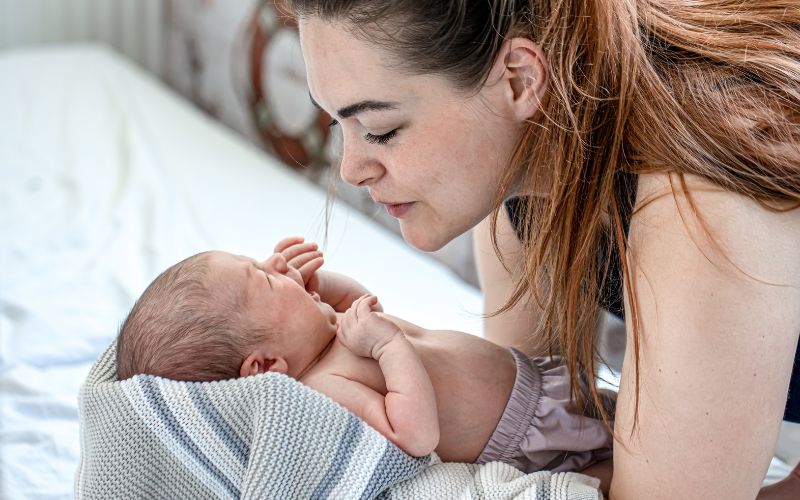
When our baby arrived, my wife and I quickly realized the importance of setting boundaries for visits. As parents, we felt both excited and overwhelmed by the influx of visitors, whether friend or relative.
What helped us most was planning and sticking to a clear, simple plan. We decided on specific dates and times in advance, and we made sure to let people know who could visit, when, and how long they could stay.
We were surprised how effective it was to gently reiterate our wishes and rules in every conversation.
Some caregivers and persons did find it difficult or even got a little cross, especially when asked to wait if the child was asleep. But we learned to follow through and explain the reasoning behind our decisions.
For instance, limiting visits allowed time for practical help, better communication, and stronger safety measures. It also taught others to respect our boundaries. When rules were not followed, we discussed the consequences calmly and respectfully.
The key was to stay consistent and repeat what we expected without sounding harsh. In the end, being ready and eager to protect your newborn’s peace and health truly brings great benefits to everyone involved.
Rules for Visiting a Newborn

When a new baby arrives, it’s a joyful time, but also overwhelming for new parents. As someone who’s been through this phase, I can tell you that setting clear rules for visiting a newborn is essential—not just for the family, but for the baby’s health and well-being.
Many visitors don’t realize how much of a burden unexpected or unplanned visits can be. That’s why it’s important to gently share the dos and don’ts upfront, so everyone feels included but also understands how to be respectful and mindful.
This section covers the things you should prioritize when letting people meet the baby. For instance, always ask visitors to wash their hands and not visit if they feel unwell—it’s a simple way to protect both the baby and the parents’ peace of mind.
By taking small but thoughtful steps, you make it easier for the family to adjust and enjoy their time together without added stress.
What to do when meeting a newborn baby

- Always call ahead and arrive at the arranged time with the parent’s or caregiver’s consent.
- If you’ve been exposed to an illness like COVID-19, flu, or pertussis (a highly contagious respiratory tract infection), wait two weeks before visiting.
- Make sure you’re up to date with all necessary vaccinations, including protective vaccines taken beforehand.
- Wash your hands thoroughly before, during, and after the visit. You may also be asked to wear a mask, especially around the newborn.
- Respect the new parents’ space. Ask if it’s OK to pick up, touch, or hold the baby — and always watch for cues that it’s time to leave.
- Don’t bring your dog or come straight from a potentially risky area like hospitals or crowded spaces.
- Don’t just show up — wait for an invitation. The family’s well-being and the new baby’s health come first.
- Avoid being a burden. Bring a meal, help tidy the home, or simply give attention and support to the parents.
- No photos without permission — and never post anything online without asking first.
- Be respectful and follow all the little dos and don’ts — these small things prioritize comfort and protect the baby.
- This section covers everything you need to know to be a thoughtful visitor during such a sensitive time.
- Returning the Baby Back to Mom when Crying: It’s common for babies to cry in order to communicate their feelings. When the infant starts weeping while you’re holding them, you shouldn’t be anxious. The most effective strategy of action is to tenderly return them to their mother. Moms have a special skill for identifying and calming their baby’s needs. So, anytime the baby cries, keep in mind to return them to their mother’s loving arms.
- Never bring a cigar near a newborn: It is not safe to smoke (cigars or marijuana) around a child. The developing respiratory system of a newborn can be seriously harmed by exposure to second- and third-hand smoke. You should take extra precautions to avoid smoking near a newborn and to avoid wearing clothing that might have smoke residues or stanins on it.
- Never ignore feeding cues: It’s important to pay attention to a baby’s feeding cues. Watch for early feeding cues like opening their mouth, sucking on their fingers, or smacking their lips when you’re holding an awake infant. These signals show that the infant is getting hungry. Before the infant starts to cry, it is best to give them back to their mother so that their nutritional needs can be satisfied right away.
- Noise Levels Down Around the Baby: Keep your voice down to avoid upsetting or frightening the little one or adding stress to weary parents. Speak softly demonstrates your concern, promoting a calm and cozy environment for both parents and infants.
- Stay away from hot beverages while holding the baby: Refrain from holding a hot drink while you have the baby in your arms. Hot beverages can accidentally spill, posing a risk to the baby’s delicate skin. It’s best to complete your drink or put it aside before holding the infant in order to protect their safety and avoid any potential accidents. This safety measure ensures a worry-free and secure time spent bonding with the child.
What not to do when meeting a newborn baby

- Never visit a newborn unannounced — always check first if it’s OK with the family or parents.
- If you’re feeling unwell or had contact with others who are sick, wait a week after you’ve fully recovered.
- Respect the wishes of the parents and avoid making extra work for them during your visiting time.
- Avoid bringing children to someone’s home with a baby, unless clearly invited.
- Do not wear strong perfumes or use scented products while visiting — these can irritate the baby.
- Never touch the baby without asking the parents for consent.
- Please don’t kiss the baby on the face or anywhere — it’s safest to avoid kissing altogether.
- Never wake a baby if they’re asleep — their sleep is essential and must be respected.
- Ignoring any of these can be seen as disrespect and add unnecessary stress for the parents.
Is it OK to kiss a newborn?
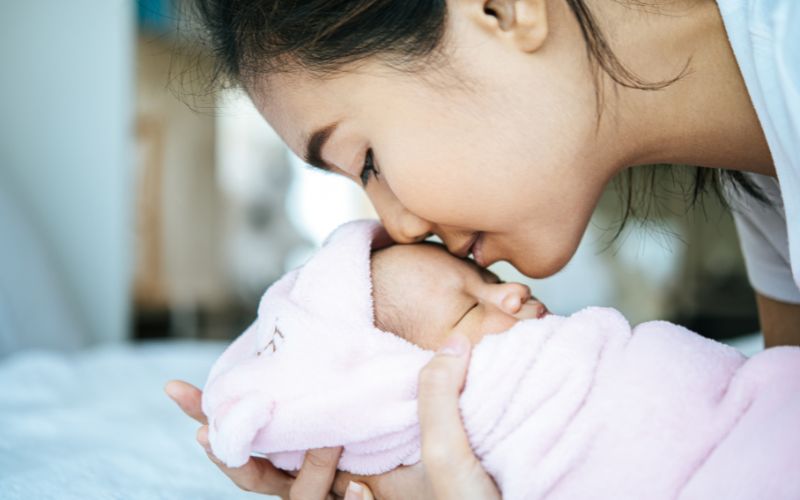
I remember holding my best friend’s baby for the first time, and my natural instinct was to show affection through a kiss. But I quickly learned how dangerous kissing newborns can be. Many adults carry viruses and bacteria without knowing it.
One serious concern is the herpes simplex virus, or HSV-1, which is type 1 and causes cold sores. Even if a sore isn’t visible, the virus might still be present in the body.
While older children might just get a mild illness, a newborn could rarely contract something far more serious — even life threatening.
Trusted voices like the nonprofit Kit Tarka Foundation strongly advise that only parents and healthy caregivers should kiss the baby, and even then, only if there are no signs of a sore and it’s fully healed.
Safer ways to show love include gentle touches and warm cuddles, which I now always offer instead. It’s a small change that protects the baby while still giving them all the warmth they deserve.
Note: Just remember Dr. VanVleet says “a mild cough from RSV or pertussis in an adult can be serious and even deadly in a newborn, so don’t visit if you’re not feeling well,”
When is it safe to have visitors?
From my experience working with new families, I’ve learned that the right time for a visitor depends entirely on how comfortable the parents feel.
According to Dr. VanVleet, it’s safe to welcome guests as long as they take proper precautions. In some cases, it’s best to wait a few weeks—especially if the birth was complicated or the parents need time to rest.
But sometimes, arriving guests can’t be avoided, and in those moments, it’s okay to do what feels right. Every family has its own reason and rhythm.
The most important thing is that the parents use their own judgment. If they feel it’s too soon, they should feel confident in asking visitors to avoid coming for now.
On the other hand, if everyone is healthy and precautions are taken, early visits can be just fine. Each situation is unique, and finding balance takes care, patience, and open communication.
When should family visit a newborn?
In the early days and weeks after welcoming a newborn, many parents feel overwhelmed with the sudden shift in routine, tired from sleepless nights, and buried under household chores.
Having family around can be a great help, especially when it’s the right time and done respectfully. I remember when my baby arrived, we waited a few weeks before letting members like siblings and extended family come by.
We wanted to avoid exposure to any contagious illness like a cold, and took advice from Dr. VanVleet who explained the risks and benefits of early visits, especially before the baby is older than 3 months.
From my experience, the best approach is to ask your gut — if something feels uncomfortable, it’s okay to wait before sending out an invitation.
Make sure anyone visiting is healthy and able to provide genuine help, not just cuddles. I’ve seen some parents too polite to set boundaries, but your baby’s health always comes first.
When it comes to siblings, giving them small chores helps them bond with the newborn while also contributing to the household.
What about siblings?
When I brought my newborn home, I was filled with joy—and anxiety. Everyone in the family, from siblings to distant relatives, wanted to see the baby, hold them, and even plant a sweet kiss on their face or tiny toes.
As a parent, it’s important to stay vigilant and kindly remind visitors of safety rules. Whether it’s your brother, sister, or even grandma, always urge them to wash their hands before touching the baby.
This simple habit can help prevent the baby from getting sick during those early, fragile weeks.
I still share what Dr. VanVleet once told us in a newborn care class—don’t be afraid to speak up for your baby’s health.
That advice helped me build the confidence to create gentle boundaries with our loved ones. Especially with younger siblings who may not understand germs, a friendly explanation goes a long way.
Letting them share time without direct contact, like talking or singing to the baby, keeps everyone happy and safe.
How do you say “no” to visitors to a newborn?

When our baby was born, the excitement among parents, friends, and visitors was overwhelming. But as Dr. VanVleet once wisely shared in a podcast I listened to, it’s okay to set limits—even when a visit is expected.
Many people show up not expected, and that can feel stressful during those early days. That’s why I learned the importance of nicely telling people how we were managing things and what we were comfortable with. It’s not rude—it’s being careful with your child’s health.
Ask your loved ones to stay away if they’re not feeling well, and be upfront about things like masking and sanitizing before they arrive. It might feel awkward the first time, but soon, everyone understands.
We also made sure to only allow short visits—we didn’t want them to be too long or tiring for the baby. It was a wonderful way to protect our newborn and also give ourselves the time to adjust.
Setting boundaries early helps create a safe, warm space where your baby can grow peacefully, and where your support system learns to respect the rhythm as your baby grows.
Conclusion
Welcoming a newborn into the world is a beautiful yet sensitive experience for parents, caregivers, and the immediate family. From the first few days, it’s crucial to protect the baby’s immune system, which takes time to develop.
That’s why delaying visits from extended friends and family—until the baby has begun to settle into a routine—is often advised. During my own experience as a new parent, we found it helpful to schedule focus visits only with those who were up to date on immunizations and understood the importance of practice good hygiene.
Health professionals and hospitals often provide rules visiting, and those guidelines are not just suggestions—they’re designed to protect the baby and create a safe and supportive environment.
Before visiting a newborn, it’s respectful to consider the location of the visit, whether at home or in a hospital, and to follow the hospital visiting rules or wishes of the parents. Boundaries respect is key.
It’s perfectly okay for parents to set boundaries of the family, whether it means delaying home visits, limiting the number of people present, or requesting proper hygiene practice to avoid germs.
We personally asked all our friends and family to support our new rhythm by honoring our rules, helping us enjoy this special time, and avoiding any transmission of germs or infections.
This allowed us the time to bond, settle, and let our newest member grow in a peaceful, loving environment.

Muhammad Sohaib is an experienced SEO expert with over 4 years in the digital marketing world. He is the founder of MomsChild.com, a growing parenting blog that covers topics related to kids, moms, baby products, and helpful family tips. Sohaib combines his SEO knowledge with a passion for creating content that supports parents in making informed choices. Through MomsChild, he shares practical advice, trusted product guides, and informative resources to help families navigate the joys and challenges of parenting in today’s world.





